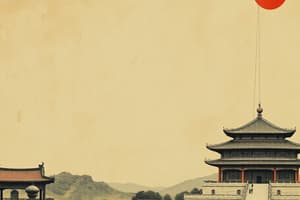Podcast
Questions and Answers
Who contributed to the good fortune of the Manchu Qing Dynasty?
Who contributed to the good fortune of the Manchu Qing Dynasty?
- Li Tzucheng, a successful bandit (correct)
- A Chinese military general
- The last Ming emperor
- A group of Jurchen tribes chieftains
Why did the Manchu Qing Dynasty refuse to leave the capital of Beijing after driving Li Tzucheng away?
Why did the Manchu Qing Dynasty refuse to leave the capital of Beijing after driving Li Tzucheng away?
- They wanted to establish their own dynasty (correct)
- They wanted to continue their life of banditry
- They were seeking revenge against the Ming Dynasty
- They were invited to stay by the Chinese nobility
How did the Qing Dynasty differ from the Mongols in terms of governance?
How did the Qing Dynasty differ from the Mongols in terms of governance?
- The Qing Dynasty was a 'foreign dynasty' while the Mongols were not
- The Qing Dynasty was more ruthless in its conquests
- The Qing Dynasty did not observe Confucianism
- The Qing Dynasty was more tolerant of Chinese customs and traditions (correct)
What was the territory of the Qing Dynasty?
What was the territory of the Qing Dynasty?
What practice did the Manchus continue from the previous dynasties?
What practice did the Manchus continue from the previous dynasties?
What was the name of the capital of the Qing Dynasty?
What was the name of the capital of the Qing Dynasty?
What was a key difference between the Manchus and the Chinese?
What was a key difference between the Manchus and the Chinese?
Which emperor prohibited intermarriages with the Chinese and the custom of foot binding?
Which emperor prohibited intermarriages with the Chinese and the custom of foot binding?
What did Emperor Kangxi enjoin the people to follow?
What did Emperor Kangxi enjoin the people to follow?
What was achieved by Chien Lung during his reign?
What was achieved by Chien Lung during his reign?
What was a valuable product that sparked interest from European countries?
What was a valuable product that sparked interest from European countries?
Why did Catholic missionaries want to spread Christianity throughout?
Why did Catholic missionaries want to spread Christianity throughout?
Flashcards are hidden until you start studying
Study Notes
The Manchu Qing Dynasty (1644-1912)
- The Qing Dynasty was founded by the Manchus, a federation of Jurchen tribes, after the fall of the Ming Dynasty.
- The last Ming emperor was forced to commit suicide by Li Tzucheng, a bandit leader who had amassed wealth and invaded the capital of Beijing.
- The Chinese military general sought the Manchu's assistance in ending Li Tzucheng's banditry, and after driving him away, the Manchus established their own dynasty.
Territorial Extent and Governance
- The Qing Dynasty's territory included Mongolia, Manchuria, Korea, Indochina, Tibet, east Turkestan, and the provinces of China.
- Peking served as the capital of the Qing Dynasty.
- The Qing Dynasty observed Chinese customs and traditions, accepted Confucianism, and appointed members of the Chinese nobility in their court.
- They maintained firm control over sensitive government positions and continued the practice of conducting examinations for those who wanted to serve in government.
Manchu Identity and Traditions
- The Manchus maintained their own distinct identity and traditions, including their manner of dressing and hairstyle, with a shaved front and braid down the back of the head.
- They forbade intermarriages with the Chinese and the custom of foot binding among the women of the Chinese elite.
Notable Emperors
- Emperor Kangxi ruled from 1661 to 1772 and brought glory to the Qing Dynasty.
- Kangxi issued a proclamation that emphasized the importance of following Confucius' teachings and the government's policies.
- Emperor Chien Lung, Kangxi's grandson, ruled from 1736 to 1796 and extended Chinese influence over Korea, Anman, Burma, and Nepal.
- Chien Lung was a prolific poet and an expert in calligraphy, earning the respect of scholars.
Trade and Colonization
- The Middle East was a rich source of spices during this period, making it a valuable commodity.
- The Christian countries' launch of the Crusades led to the prohibition of trade between Christian countries and the Middle East.
- The Venetian traders profited immensely from trade, and Spain and Portugal aspired to take part in the spice trade, leading to colonization efforts.
- Catholic missionaries wanted to spread Christianity throughout, another compelling reason for colonization.
Studying That Suits You
Use AI to generate personalized quizzes and flashcards to suit your learning preferences.




